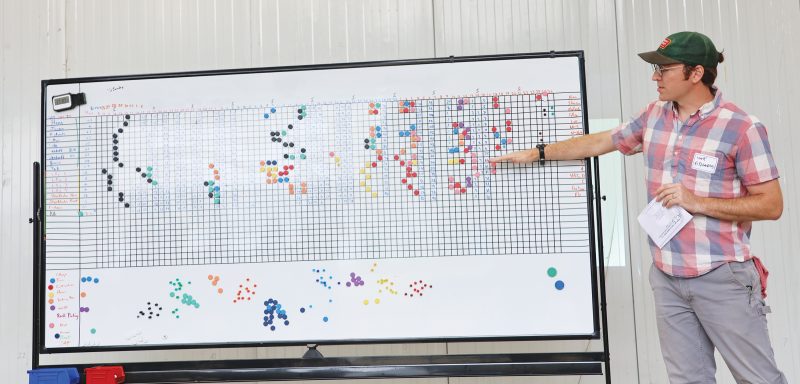Note: This is the 9th installment in the 12-part “A Sense of Where You Are” series.
When someone calls Matthew Fitzgerald for advice about getting into organic crop production, the central Minnesota farmer’s first response is a question of his own: “Do you own a fishing boat?” If they say yes, Fitzgerald then recommends they sell it, because, as he puts it, “You’re going to have to work all summer” to raise organic crops.

On an overcast day in late August, the 33-year-old farmer provided a visual representation to back up his argument that organic crop producers would be better off investing in ice fishing gear.
“This is what being an organic farm looks like,” Fitzgerald quipped as he spun around a large dry-erase whiteboard set up in his farm’s cavernous machine shed. This “big reveal,” as he called it, was meant to show a group of farmers — along with lenders and folks involved with the marketing-end of organic farming — gathered for a field day that although organic agriculture comes with benefits such as a lower impact on the environment and premium prices, it also involves some very, very busy days during the growing season, days made even more hectic by the fact that climate change narrows the window of opportunity available for getting critical field work done.
The field day, which was sponsored by the Organic Agronomy Training Service, Grain Millers, the U of M’s Forever Green Initiative, and the Minnesota Office for Soil Health, was focused on providing a comprehensive view of the opportunities and challenges associated with organic crop production. Fitzgerald’s planning board, which he calls “Farm Flow,” was a good place to start.
The chart uses different colored dots to track daily weed management across the 2,700 acres the McLeod County farm grows certified organic corn, soybeans, wheat, peas, and edible beans on. Each color represents a different weed control method — tine weeding, rotary hoeing, flame weeding, and utilizing an electric zapper. Why the fixation on weed control? Fitzgerald said that they’ve found that the biggest factor impacting organic yields is how well weed pests are controlled. And whereas a conventional farm might have at its disposal a few “big hammers” in the form of chemicals to control problems, an organic farm has to rely on several smaller practices and tools. Timing is everything: getting rained out on a day when you needed to get in and rotary hoe can have major negative repercussions down the line. And such weather disruptions are more common than ever these days.
“We’re really on the front lines of climate change as organic farmers,” said Fitzgerald. “We don’t have cover-up tools available to deal with those swings in the weather.”
Fitzgerald’s father, Joe, has been raising organic crops since 1994, and he says the Farm Flow board provides a handy way to, at a glance, track gaps in the weed control schedule and figure out what needs to be done to fill in those blank spots. The Fitzgeralds are so happy with the Farm Flow system that they are in the process of digitizing it and making it available to other farmers.
After a farmer panel on marketing, a mini-tour of the Fitzgeralds’ weed control equipment, and a field-side discussion about the balancing act organic crop farmers must strike between controlling weeds with tillage and maintaining soil health, it became clear why something like a giant planner is needed to help navigate the growing season. It can also help a farmer justify that feeling of being a bit overwhelmed at times.
“Stepping back after going through a weeding season, it’s like, ‘Wow, that’s why I’m so tired,’ ” Matthew said.
Brian DeVore edits the Land Stewardship Letter and produces the Ear to the Ground podcast.
Give it a Listen
- Ear to the Ground 355: Silver Buckshot (Joe & Matthew Fitzgerald)
Installments in the ‘A Sense of Where You Are’ Series:
- Introduction to the Series: A Sense of Where You Are
- Red Dresses & Magic Management
- In the Blood
- Seeking Signs of Life
- Forest for the Trees
- The Quickening
- Food Bank Booster
- First Things First
- The Big Picture
- The Snowball Effect
- 7 Years Later
- Against the Grain